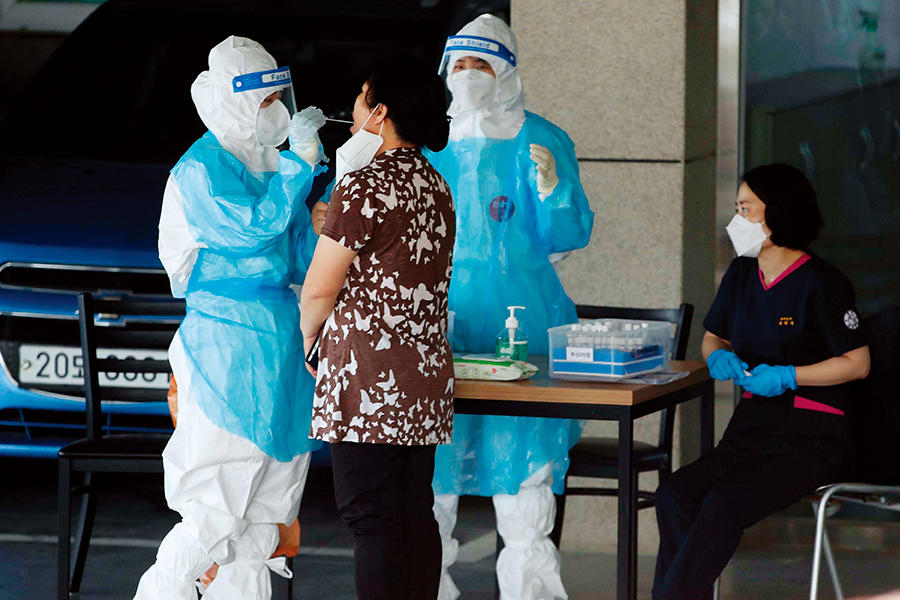본문영역

- CULTURE FOR YOU
- Novel infectious diseases in the 21st century
-
Why vaccination is recommended
despite breakthrough infection
Risk of death decreases significantly
in spite of decreasing preventive effect Written by_
Lee Jeong-ah, reporter from Dong-A Science
Written by_
Lee Jeong-ah, reporter from Dong-A Science
- As Delta variant, which is more contagious than existing COVID-19 variants, is spreading, so-called ‘Breakthrough infections’ is taking place which means even the vaccinated are infected with COVID-19. Experts recommend people to receive COVID-19 vaccines because of reduced risks of getting severe symptoms and death even when breakthrough infection happens.

By the time COVID-19 vaccine was approved for emergency use and vaccination began, there were some hopes that we may announce "With Corona" scheme which allows people to live with COVID-19 after 70% of the total population are vaccinated and have antibodies against the virus. In fact, the UK and Singapore, which started vaccination earlier and significantly raised vaccination rates, took a bold move and started "With Corona" scheme in July when COVID-19 began to reemerge. Singapore is carefully moving step by step, but the UK has lifted almost all disease control measures such as mandatory wearing of masks indoor, limiting the number of people at private gatherings, and social distancing on August 19 in search of freedom.However, the number of newly confirmed cases has recently increased again in the two countries, which had been quiet for a while thanks to vaccination. It is because of the ‘Breakthrough infection’ which means even the vaccinated are infected with COVID-19.
Delta variant that tricks the immune system causes the breakthrough infection
There are two main reasons. One is that the virus developed some ability to avoid the vaccine's surveillance, and the second is that the vaccine's effectiveness has decreased over time. In order for the COVID-19 virus to invade human cells, the spike protein of the virus must bind to receptors on the surface of the host cell. Our immune system produces antibodies that can adhere to the spike protein instead of receptors to fight the virus. This is the basic theory of vaccine which builds defense against viruses by making antibodies in advance. Let’s say human cell is a house, virus is a thief, and vaccine is a door keeper. The door keeper fills a fake lock (antibody) with a key so that the thief cannot open a real lock (receptor) with the key (spike protein) and get into the house . However, the spread of COVID-19 virus over the large population worldwide multiplied the virus which reshaped the key that can open the real lock and avoid the fake lock (mutation). That means higher probability of deceiving the fake lock and opening the real lock. Delta variant which spread around the world is the new key. Delta variant is known to be more contagious than existing variants of COVID-19. Due to mutated spike protein, antibodies against COVID-19 lose ability to prevent virus intrusion. When people finish the second dose of vaccines, developed by Pfizer of the U.S. and BioNTech of Germany, the vaccines were 93.7% effective in preventing COVID-19 infection. But they were only 88% effective in preventing Delta variant. The vaccine jointly developed by AstraZeneca and Oxford University in the UK was 74.5% effective in preventing the infection, and was only 67% effective against Delta variant. In other words, as Delta variant spreads, the risk of breakthrough infection increased. This is why even the vaccinated should wear masks and keep social distancing.In addition, unlike vaccines against other infectious diseases such as measles, the COVID-19 vaccines do not have a lifelong preventive effect after inoculation. Although no specific evidence has been identified yet, experts believe that the effect of COVID-19 vaccination lasts only for 5 to 7 months. Countries that started vaccination early, such as Israel, the United States, the United Kingdom, France, and Germany, have started or are about to give additional vaccination (booster shots) for fear of such decreased immunization effect.
The risk of serious illness can reduce despite decreased prevention effect
Some people question whether it is necessary to get the COVID-19 vaccine when even the vaccinated can have breakthrough infection and side effects after inoculation. However, experts recommend vaccination, saying that even if the vaccine does not prevent COVID-19 100%, it can prevent most of the serious complications or death caused by the infection. In particular, the Centers for Disease Control and Prevention (CDC) recently released a report, saying that COVID-19 vaccines may have decreased preventive effect but significantly reduce the risk of serious illness or death. On September 10 (local time), the CDC released the results of investigation in its weekly report which probed into infection and severe illness, updates on deaths, and preventive effect against Delta variant, all in relation to COVID-19 vaccination. It first compared the difference in COVID-19 infection and severe illness between the vaccinated and unvaccinated people from April to July. The result showed that the unvaccinated were 4.5 times more likely to get COVID-19 infection, 10 times more likely to develop severe illness and be hospitalized, and 11 times more likely to die. The research team analyzed the difference in infection rates between the unvaccinated and vaccinated people. And they said the difference became larger as the number of vaccinated people has increased in the United States since June 20. The research team also reported on the same day that COVID-19 vaccines still have excellent effects in preventing severe symptoms even in the epidemic of Delta variant, which is more contagious. According to a survey, from June to August, on vaccination updates involving hospitalized patients with COVID-19 in nine states of the U.S., vaccination was 86% effective in preventing hospitalization. Based on the reports, the CDC recommended vaccination to avoid complications and death caused by COVID-19. However, there are still concerns that it’s hard to stop COVID-19 epidemic as a number of people do not trust the vaccines, and therefore do not receive them. Korea thinks that increasing vaccination rates can stop the spread of the virus which in turn may relax its disease control measures and lead to "With Corona" scheme. Health authorities believe that at least 80% of adults and at least 90% of the elderly in Korea should be fully vaccinated by the end of October. However, even after vaccination, breakthrough infection may occur. So for the time being, all people must strictly comply with disease control measures such as wearing masks indoor and social distancing. 

